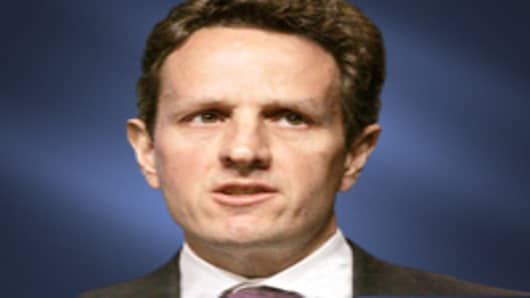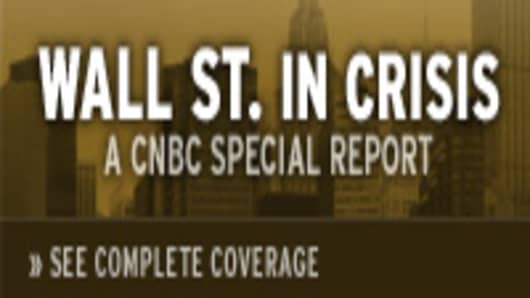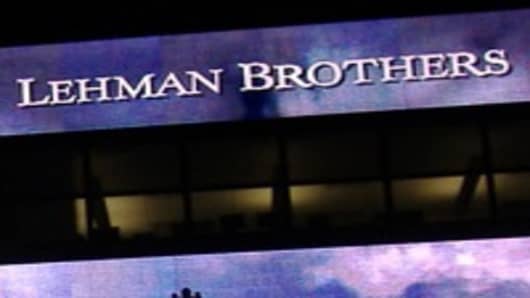Though the Senate has questions about whether Treasury Secretary-designate Tim Geithner has his own fiscal house is in order, his confirmation hearings will focus on what he has to say about the nation’s finances.
Geithner, who’s admitted to not paying some employment taxes in the past, will probably be asked to state his views on everything from tax policy to fiscal stimulus to the government’s ever-expanding efforts to rescue both the financial system and the real economy.
Geithner’s comments will be particularly insightful because as president of the New York Federal Reserve Bank, he’s been a key player in the government’s handling of the financial crisis, working closely with Treasury Secretary Henry Paulson and Fed Chairman Ben Bernanke.
And given the federal government’s mixed record on handling the crisis, the stakes are unusually high for both Wall Street and Main Street.
“The market wants a break from the inconsistency and apparent confusion of the past and wants a clearly laid out strategy of what needs to be done, how it will be done, what the timelines are and what are the contingency plans,“ says veteran money manager Jim Awad, Managing Director at Zephyr Management.
- Governors: What Obama Should Do For Economy
- BofA Gets $20 Billion, Merrill Loses $15 Billion
- Where Has the TARP Bailout Money Gone?
Like many on wall Street, Awad has been both supportive and critical of the government’s efforts, but his views suggest waning patience and confidence, following the sudden collapse of Lehman Brothers and the ensuing shocks to the system.
“Since September you got the feeling, the Treasury and the Fed were reactive, on the defensive,” says Awad. “What the market needs is confidence, consistency. We still have the toxic assets, we still have the banks flying through the capital that was given to them, you still have a economy in a rapidly declining stage.”
Given that backdrop, CNBC.com decided to survey economists, business groups and money managers about the message Geithner needs to bring to the hearing and what he might and should say about a number of key topics.
The Basics
Mickey Levy, chief economist at Bank of America, says its important Geithner reveal “what role he played in assisting the Treasury in developing some of its alternative liquidity facilities, such as TARP, and his honest assessment how he would change things. For instance, what we need to loosen up the credit channels.”
Though that’s clearly the trillion-dollar question for the economy, questions about Geithner's culpability and professional qualifications are unlikely to be much of an issue.
"The benefit of Geithner is he’s both close enough and far enough," says Eric Dezenhall of Dezenhall Resources, whose firm specializes in crisis management. “He could see what went wrong but he wasn’t the man the cockpit. He’ll probably be able to walk the fine line.”
TARP
This is currently the hot topic, with debate raging anew over the best use of the $700 billion Wall Street bailout fund.
Most in our survey say Geithner will have to weigh in but will most likely take a middle-of-the road position. That would mean broadly supporting the view of Congressional Democrats and the President-elect, who want a commitment to foreclosure relief, while also emphasizing the need to shore up financial institutions and the system overall.
“We'd love to hear Geithner echo Bernanke's statement from [last Tuesday] about the need for troubled asset purchases,” says Travis Larson, a spokesman for the Securities Industry and Financial Markets Association."
“We want to hear how they’re going to get the banking system moving again, banks loaning again,” says Hank Cox, senior VP at the American Association of Manufacturers. “Manufacturing is highly capital intensive. Members of ours with good credit can’t get routine lending.”
Stimulus Package
Though most surveyed say this is an important issue and Geithner probably needs to comment on it, there’s a broad divergence on just how.
One tact is to simply say he supports Obama’s plan and take a pass. Others say a more studied endorsement is a needed.
“What he really needs to do is to continue to keep making the case for the size of the economic stimulus package," says Christian Weller, senior fellow at the Center for American Progress. “He needs to clearly say why $775 billion is the right number.”
Others say Geithner needs to also play cop on the beat.
“He has to address his comfort level with the magnitude of the stimulus package and the Treasury borrowing associated with it," says Levy. “That’s a very delicate issue.”
Regulatory Reform, Rethinking Lehman
Regulatory Reform
Since this subject is one that cuts to the heart of the current crisis, Geithner will no doubt be tested on his views, but it's unlikely the discussion will run that deep, partly because of the many facets involved.
Of keen interest will be thoughts on what becomes of Fannie Mae and Freddie Mac, the two public-private mortgage giants that failed and are now under government control.
The Mortgage Bankers Association, for one, is looking for “any markers he puts down,” says Steve O’Connor, senior VP for government affairs. “The bigger issue is the longer term future of these enterprises.”
Another complex issue is accounting standards, from general oversight to actual provisions, such as the highly controversial mark-to-market standard, which many cite as an obstacle to easing the credit crunch.
Other observers think Geithner should address the government’s expanding umbrella of guarantees, covering anything from commercial bank deposits to money market accounts, many of which reside under the FDIC.
Lehman Brothers
You might think thissubject could get top billing but it might actually sink to the bottom; that's the sudden and stunning collapse of this brokerage firm, which many in Washington and Wall Street consider the government’s biggest mistake.
As New York Fed boss, Geithner had to be very familiar with Lehman's finances and operations, including its critical role in the commercial paper market, which froze after the firm’s failure, requiring a government backstop.
Given that, you’d think Congress might want to know what he would have done and what he thought of the way Bernanke and Paulson handled the case.
Maybe not; most surveyed said this piece of the past is better off left alone and any analysis wouldn’t provide much value anyway.
“For him to say he disagreed with his boss is a bad thing,” says Awad. “Talking about it in public will only make fragile confidence more fragile.”
In this environment, that – and even Geithner’s tax mess – might not become big issues or obstacles.
“I think that in this climate, even the Republicans don’t want to be seen as gratuitously standing in the way of an emergency management team,” says Dezenhall. “The fact that we are dealing in a triage environment is helpful to Geithner.






